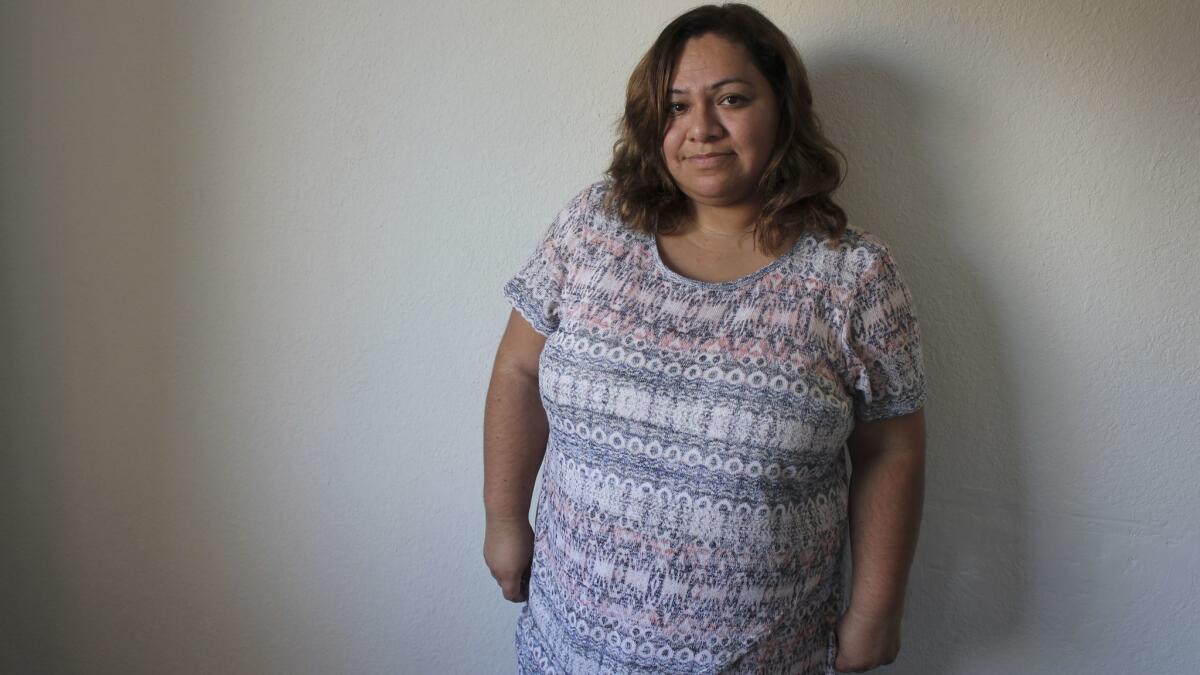‘You’re just there, trapped’: Why one Mexican woman decided to ‘self-deport,’ long before Trump

- Share via
Reporting from Tijuana — Any time a cop passed her on the road, she began shaking. When police set up checkpoints in her neighborhood, her phone buzzed with warning text messages.
She worried about getting carded at bars. Boarding planes. Attending college. Anything that required an ID, which she didn’t have because she was in the country illegally.
For a decade, Paula Flores Colorado felt crippled by a gnawing fear that eventually became unbearable.
To find peace, she returned to Mexico in 2009.
Some of President Trump’s immigration advisors during and after his campaign, including Kansas Secretary of State Kris Kobach and now-Atty. Gen. Jeff Sessions, called publicly for immigration enforcement strategies so tough that they encourage those in the country illegally to “self-deport.”
The idea of spurring immigrants to leave on their own volition by making life uncomfortable for them dates to at least the 1990s, when conservatives waged a bitter anti-illegal immigration campaign. The effort climaxed in 1994 when California voters approved Proposition 187, which aimed to deny services to those in the country illegally.
Courts struck down most of the measure’s provisions, and the notion of self-deportation quietly died away. It arose again in 2012, when Republican presidential candidate Mitt Romney floated the idea when asked about illegal immigration.
“The answer is self-deportation,” Romney said. “Which is people decide they can do better by going home because they can’t find work here, because they don’t have legal documentation to allow them to work here.”
I wanted to be as American as I could possibly be
— Paula Flores Colorado
The Trump administration has launched an aggressive campaign of detentions, announcing this month that immigration agents had arrested more than 40,000 people since the president signed executive orders widening the scope of who could be targeted for deportation. The tally represents a 38% jump over the same period last year.
“These policies are designed to increase anxiety, they’re designed to create fear in immigrant communities,” said David FitzGerald, co-director of the Center for Comparative Immigration Studies at UC San Diego. “The government knows they’ll never be able to go out and deport the unauthorized population — and one of their stated hopes is that people will self-deport.”
Flores said she found that living in the country illegally was too much to endure.
Her story from 2009 says much about the difficulties immigrants have faced over the years — even under the administration of former President Obama, who came to be known in some circles as the “deporter-in-chief.”
As the mother of a 5-year-old son in Tijuana, Flores says she doesn’t want him to feel the fear that drove her back to a country she barely knew.
“Never again,” said Flores, 37. “I don’t want him to be illegal. I don’t want him to feel the way I felt.”
Flores was 12 when her family traveled on tourist visas to Southern California from Tabasco state. Her mother and a sister returned to Mexico, but Flores and another sister stayed with an aunt in Bell.
She learned English by scribbling down Mariah Carey and Janet Jackson lyrics and asking anyone around what the words meant.
“I wanted to fit in. I didn’t want to have an accent,” she said. “I wanted to be as American as I could possibly be.”
But during her junior year at Bell High School, she learned the price of her legal status. Without a Social Security number, a guidance counselor told her, she couldn’t apply for college. Heartbroken, she didn’t bother taking the SAT.
Another shock came two years later, during the summer of 1999. She was 19.
She and a sister had vacationed in Mexico City and tried to return to Los Angeles using the same tourist visas that had allowed them to enter the U.S. seven years earlier.
Officers at Los Angeles International Airport ordered the sisters to secondary inspection. In Flores’ luggage, officers found evidence that she had been living in California for years: a Bell yearbook she carted to Mexico to share with old friends.
Flores said they were served with expedited orders of removal. Officers cuffed their wrists and escorted them through the airport, their heads bowed as suitcase-toting travelers stared.
They were housed overnight in a motel, she said, and flown back to Mexico the next day.
“It was the most humiliating experience of my life,” Flores said. “Like criminals, common criminals. I said, ‘We’re not criminals.’ She said, ‘Yes you are, you’re criminals, you broke the law.’”
At the time, removals from the U.S. had reached a record high in more than a century of record-keeping. Authorities expelled more than 180,000 people that fiscal year.
Jaime Ruiz, a spokesman for U.S. Customs and Border Protection, acknowledged that interacting with officers may be intimidating to some foreign nationals, but said officers are “trained to treat passengers with dignity and respect while enforcing complex immigration laws and maintaining the highest levels of national security.”
Ruiz said an average secondary inspection takes between 30 and 50 minutes; Flores said she and her sister were questioned at LAX for hours. “Claims about long unnecessary detentions are vastly false,” Ruiz said.
Later in 1999, the sisters returned to the U.S., without papers. They crossed on foot at the San Ysidro port of entry by simply blending in with Americans returning from Tijuana.
Flores’ heart raced as she strode forward, carrying a big bag of Mexican candy. If anyone asked, she would say she had crossed to Tijuana for piñata mix. But no one questioned her.
Over the next 10 years, Flores built a life in South Los Angeles. She took her niece to Chuck E. Cheese’s, danced at Las Vegas nightclubs, cried through Paul McCartney’s set at Coachella.
But her anxiety grew. She obtained an identity card issued by the Mexican consulate for Mexican nationals living abroad, but she hesitated to use it.
“It was also a brand; you’re branded as an illegal,” she said.

She was too scared to join her family at her great grandmother’s funeral in Oceanside, worried she’d get caught in the immigration checkpoint on Interstate 5.
She skipped the massive May Day rally in 2006, when half a million people flooded the streets of downtown L.A. to protest federal legislation that would penalize those who help immigrants in the country illegally — too risky.
Over the years, she said, an employer used her status to avoid giving her raises or paying overtime.
“It’s like, you’re living a happy life,” Flores said. “But at the same time, you’re not able to get out of that bubble. You’re just there, trapped.”
Several close calls triggered flashbacks of her deportation. One day, she and her sister drove up to a police checkpoint in Bell Gardens. Their chests tightened as they inched forward.
With two cars ahead of them, her sister’s baby began wailing. Moments later, it was their turn. Eyeing the bawling baby, an officer quickly waved them through.
Moments later, the infant laughed. Confused but relieved, the sisters did, too.
The sisters once were driving home from work when they were struck by a car making an unprotected left turn. The driver was at fault, but what would happen to them? They didn’t call police.
Flores had long ago achieved her goal of mastering English and spoke without an accent. She could easily pass for Mexican American.
But the fear of discovery never went away, and one day Flores announced that she was returning to Mexico. Her sister begged her to stay. This is your home. This is what you know.
When a relative drove her across the border into Tijuana in 2009, Flores instantly felt regret and fell into a prolonged depression. But in time she found a stable job, got married and bought a house with her husband and son.
She now works at an American company that provides orthopedic devices, where she was promoted three times in three years.
“We have things we never dreamt of having in the U.S.,” she said. But, Mexico “doesn’t feel like home to me. … It never has and I don’t know if it ever will.”
She hopes to return to the U.S. and recently attended a legal clinic in Tijuana to learn about the process for legal immigration.
A sister, meanwhile, still lives in California with her husband of 18 years and their two daughters. She is still without papers.
As the Trump administration cracks down on illegal immigration, the sister finds herself paralyzed by the same angst that drove Flores to self-deport. She’s prepared an emergency bag for her family — with her daughters’ U.S. birth certificates and other important papers — in case she gets deported.
But she has no plans to leave voluntarily.
Follow me on Twitter @AleneTchek
ALSO
Mexican band Tigres del Norte fined for singing about drug smugglers
Bloodshed, fires and chaos as thousands march in Brazil to demand president’s ouster
Death toll in Venezuela protest violence rises to 56
More to Read
Sign up for Essential California
The most important California stories and recommendations in your inbox every morning.
You may occasionally receive promotional content from the Los Angeles Times.











